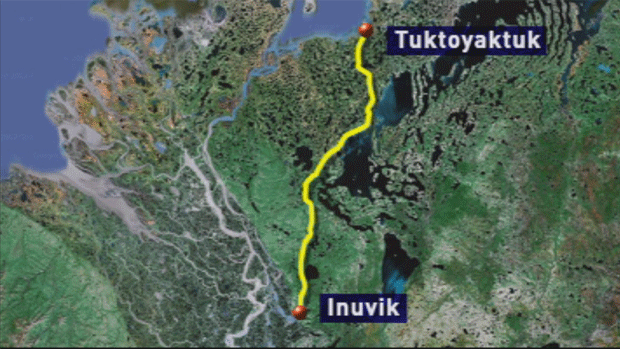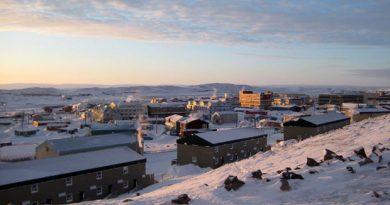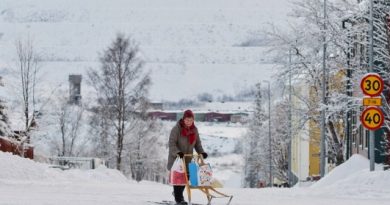Canada’s PM hails start of Arctic highway

Canada’s Prime Minister Stephen Harper was in the Arctic community of Inuvik in Canada’s Northwest Territories (N.W.T.) on Wednesday to mark the start of construction of the country’s first highway to the Arctic ocean.
Harper says the all-season road from Inuvik to the community of Tuktoyaktuk will realize the vision former Canadian prime minister John Diefenbaker had in the 1960s to connect the Arctic to the rest of Canada.
“Prime Minister Diefenbaker knew then what our government is undertaking today: constructing a highway will improve the lives of people living in the North for generations to come, facilitating economic development, creating jobs and enabling cost-effective, safe and reliable transportation of goods to and from Northern communities,” he told a gathering at the Midnight Sun Recreation Complex in Inuvik.
‘Road to resources’
But the road is about more than linking two isolated communities.
“It’s the road to resources,” said Kurt Wainman, as he set up a backdrop of heavy equipment for the Prime Minister’s visit. “It’s been called that forever. Hopefully we can re-look at all the oil companies and get back to our gas and get our communities sustainable.”
Wainman runs one of the companies building the $300 million highway.
The territory is on the verge of signing a contract for the bulk of the construction work with Northwind Industries and E Gruben Transport.
8 facts about the Inuvik to Tuktoyaktuk highway
- The road will extend the Dempster Highway, which currently ends in Inuvik, N.W.T. The Dempster Highway, which opened in 1979, was the first all-season road across the Arctic Circle. It was named for Jack Dempster, a member of the Northwest Mounted Police in Yukon who played a role in the recovery of the Lost Patrol.
- The 137-km long two-lane highway will be packed gravel, with an anticipated speed limit of 70 km/h.
- Construction will only occur in the winter when there’s less risk of damage or disruption to the permafrost.
- The roadbed will be a minimum of 1.8 metres above the tundra. McLeod says their studies show that large of a buffer helps prevent the permafrost from melting. “There are going to be areas where it’s going to be sinking,” he said. Crews are prepared to fill those areas until the road finds its steady state.
- There will be eight bridges along the route, in total 68 areas where the highway has to pass over waterways larger than two metres.
- The GNWT expects about 150 people to work on the project annually, with crews split between the Inuvik and Tuktoyaktuk ends.
- The cost of the project is currently estimated at $299 million. The federal government has pledged to contribute $200 million.The remainder will be paid by the GNWT. Annual maintenance work, including grading the road and clearing snow, will cost between $1.5 and $1.8 million each year.
- The GNWT anticipates construction will be finished by fall 2017/winter 2018.
Job creation
Any offshore drilling is still years away, but the winter road means jobs right now, and Mickey Ipana says that’s huge. He’ll have four years of steady work hauling gravel on the highway with Northwind.
“I think it’s just a stepping stone to opening up the North, getting maybe oil and gas projects up again,” Ipana says. “A lot of help for the families that were struggling for the past couple of years..”
The gravel road will stretch 140 kilometres over tundra and permafrost.
The federal government is paying for two-thirds of the project.
Some Northwest Territories MLAs are concerned that won’t be enough.
Daryl Dolynny is the MLA for Range Lake in Yellowknife.
“Cost overruns can take away from other projects,” he says. “And if that means taking away from the hospital, that should concern people.”
This afternoon the prime minister had his picture taken with construction workers.
Mickey Ipana said he wants to shake his hand.
“It’s a historic day. I’ll be happy to say to my kids and grandkids that I helped build the road.”
Related Links:
Canada:Canada’s N.W.T. seeks $600 million for roads, bridges, CBC News
Finland: Finnish roads the most dangerous in Nordics says newspaper, Yle News
Sweden:Motorists cautioned about wild boar on Swedish roads, Radio Sweden
United States:Ice-road construction reaches new levels in Arctic Alaska, Alaska Dispatch



